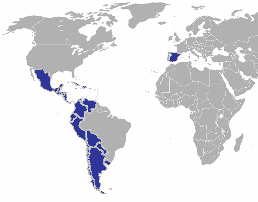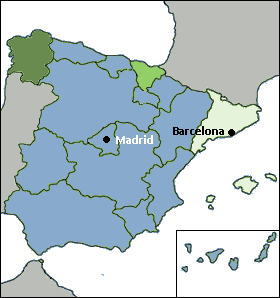Spanish Written Language
español / castellano

Spanish, referred to as 'Castellano (Castillian)' covers Latin American and Continental Spanish. Espanol is referred to when speaking to non-Spanish speakers.
The difference between Latin American Spanish and Continental (European) Spanish is slight, with only some variations on verbs and vocabulary used.
Written Spanish
Additions to Latin Alphabet: ch, ll, ñ, rr.
k only exists in foriegn words. All letters are feminine, 'la a'-the a
Spanish does not use capital letters for the month nor days of the week.
¡ is always used at the start of a statement ending with !
¿ is always used at the start of a question ending with ?
ª is an abreviation for feminine numbers/words, ie: 2nd so in Spanish would be: 2ª for "2nd door(feminine).
° is an abreviation for masculine numbers, ie: 2nd so in Spanish would be: 2° for "2nd floor(masculine).
In Spanish a point is used as a coma; eg: 27,000 is 27.000 in Spanish.
Similarly, a decimal point in English (eg:2.3%) is this in Spanish (2,3%), replacing the point for a coma.
Spanish accents
To type accents with ALT codes, hold down the ALT key, then on the numeric keypad type the three or four digits listed here. However not with laptops, ALT codes only work with the numeric keypad, NOT the row of numbers across the top of your keyboard, as on laptops.
a with acute accent
á ALT + 160 Á ALT
+ 0193
e with acute accent
é ALT + 130 É ALT
+ 144
i with acute accent
í ALT + 161 Í ALT
+ 214
n with tilde accent
ñ ALT + 165 Ñ ALT
+ 164
o with acute accent
ó ALT + 162 Ó ALT
+ 224
u with acute accent
ú ALT + 163 Ú ALT
+ 233
u with diaeresis accent
ü ALT + 129 Ü ALT
+ 154
ª abbreviation ending in a, commonly with addresses or numbers
ª ALT + 166
º abbreviation ending in o, commonly with addresses or numbers
° ALT + 167
? used at end of question and this at start:
¿ ALT + 130 + 144
! used at end of statement and this at start:
¡ ALT + 130 + 144
Spanish Alphabet
a A
b B
c C
Ch ch
d D
e E
f F
g G
h H
i I
j J
k K
l L
Ll ll
m M
n N
ñ Ñ
o O
p P
q Q
r R
s S
t T
u U
v V
w W
x X
y Y
z Z
European Spanish
Catalan, Galician, Basque
Spanish is also referred to as 'Castellano' (Castilian Spanish) which is the main official language and spoken through-out Spain. Catalan, Basque and Galician are different to Castilian Spanish but are still official languages as well as Castillian Spanish in their own regions. Catalan and Galician are very similar to Castilian Spanish whereas Basque has no similarity.

Dialects of Spanish in Spain:
Castilian Spanish (all of Spain)
Catalan (Catalonia) - light green area
Galician (Galicia) - dark green area
Basque (Basque country) - green area
Catalan includes the Eastern most corner of Spain (see map) as well as the Balearic islands. In the written form it is very similar to Castillain Spanish and can be easily read/understood.
Galician includes the north western region of Spain and is a mix of Spanish and Portuguese and is understood in its written form by both Portuguese and Spanish.
Basque, in the north east of Spain is not similar to Castilian Spanish and not understood by other speakers.
These regional languages within Spain are classified as co-official languages in their native regions along with Castilian Spanish. Although used by Local Government, Commerce will use Castilian Spanish, unless specifically aimed at that particular region. Castilian Spanish is widely spoken and used more widely in Commerce in these regions than their regional languages.
Difference between written Castillian Spanish, Catalan and Galician.
Castillian Spanish text
Catalan text
Galician text
Difference between written Castillian Spanish and Basque.
Castillian Spanish text
Basque text
English translation
Latin American Spanish
South American countries:
- Columbia
- Venezuala
- Ecuador
- Peru
- Bolivia
- Chile
- Paraguay
- Uruguay
- Argentina
Central American countries:
- Guatemala
- Honduras
- El Salvador
- Nicaragua
- Costa Rica
- Panama
Caribbean countries:
- Cuba
- Dominican Republic
- El Salvador
- Nicaragua
- Costa Rica
- Panama
Difference between European Spanish and Latin American Spanish
There is little difference between the two, similar to British English and American English. So similar grammar, although sometimes they use different vocabulary, particularly coloquial words. Both speakers can understand each other perfectly.
Difference between written European Spanish and Latin American Spanish.
Castillian Spanish text
Latin Amercican Spanish text
English translation
Improvements to this site?
Spanish Translation sample:
Todos los seres humanos nacen libres e iguales en dignidad y derechos y, dotados como están de razón y conciencia, deben comportarse fraternalmente los unos con los otros.
All human beings are born free and equal in dignity and rights. They are endowed with reason and conscience and should act towards one another in a spirit of brotherhood. (Article 1 of the Universal Declaration of Human Rights)
Spanish Speaking countries
Andorra, Argentina, Bolivia, Chile, Colombia, Costa Rica, Cuba, Dominican Republic, Ecuador, El Salvador, Equatorial Guinea, Gibraltar, Guatemala, Honduras, Mexico, Panama, Paraguay, Peru, Puerto Rico, Spain, Uruguay, Venezuala.
Indo-European Language group
Indo-European > Italic (Latin) > Romance
Difficulty in learning Spanish as a native English speaker
The Defense Language Institute categorizes Spanish as relatively easy (level 1, of 4 levels)
Spanish letter writing samples
- Letter (formal)
- Letter (informal)
